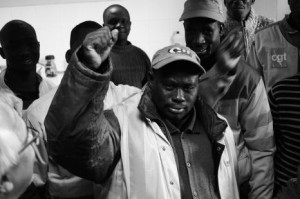Oct 27, 2009
Colonised yesterday; exploited today; tomorrow, regularised
 This article first appeared on the French New Anticapitalist Party’s website on 22 October.
This article first appeared on the French New Anticapitalist Party’s website on 22 October.
Translated for Workers’ Liberty by Ed Maltby.
A new wave of undocumented migrant workers’ strikes, bigger than that of April 2008, began on the 12th of October. Strikers are determined to get papers for all. To win that, solidarity from all workers is necessary.
“Colonised yesterday; exploited today; tomorrow, regularised”
That is the slogan of the thousands of undocumented migrant workers who are taking part in the new strike wave, initiated by the CGT, CFDT, SUD, FSU and UNSA unions and supported by associations such as the Ligue des droits de l’homme [human rights league], Cimade, RESF [a campaign to defend undocumented migrant school students and their family], Femmes Égalité, Autremonde, and Droits devant!!, etc. Since the 12 of October the movement has steadily grown, from 1,000 on the first day to 3,000 a week later. There has been a qualitative and quantitative leap from the strike wave of April 2008, which involved 600 workers and won 2,000 regularisations.
After several days, over 700 “isolated” workers, i.e. workers employed by unscrupulous employment agencies, invaded the Synergie and Adecco agency offices in Paris, 400 occupied the bosses’ canteen, and 380 occupied the offices of a national federation of construction employers. More than 30 workplaces are occupied. On the picket lines which “isolated” workers have organised, workers of all trades are coming to participate – butchers, bakers, gardeners, etc. At Vitry-sur-Seine (Val-de-Marne), the migrant workers have occupied a tax office in order to denounce the complicity of the state which pockets the taxes and social security contributions of undocumented migrant workers without giving them access to the basic rights of citizens. It is without a doubt the biggest movement of precarious workers ever organised in France.
Undocumented migrant workers are catapulting the inhuman working conditions and exploitation suffered by hundreds of thousands of people into broad daylight. They are highlighting the way capitalism puts workers in the most precarious situations in order to create maximum profit. They are at the heart of the system, employed by both public and private sector bodies, to renovate the Paris Metro or the tram tracks, in 19th Century working conditions. In the security sector, of 150,000 workers, 15,000 have no papers.
This exemplary movement perfectly illustrates the contradictions of capitalism. In order to maintain its profits, this system has for years implemented a policy of the outsourcing and casualisation of labour. This logic is pushed to its extreme with undocumented migrant workers. They suffer a growing state and police repression as Fortress Europe develops – a racist Europe, which lauds the free circulation of capital and allows thousands of people to die every year in the Mediterranean. There have been far more deaths at Gibraltar than at the Berlin Wall, which fell 20 years ago, but has been rebuilt across southern Europe. This situation also gives rise to resistance and revolt!
The striking workers and their supporters oppose the government’s immigration policy. The unions want Besson to formally put an end to the treatment of migrants on a case by case basis by the local prefectures. This is a first step, but the only real solution, to put an end to hyperexploitation, is papers for all. That is an advance that migrant workers cannot win alone. They need the broadest support.
The CGT’s strategy has evolved positively since the April 2008 strikes. From the outset, the movement has been larger and the CGT has been favourable to the setting up of support committees, even if the CGT leaders do not want to be overtaken by events and lose “control”. On different sites, solidarity committees have been set up. In this way the occupation of the Paris tramway was able to continue for a week. The organisations and associations of the 19th and 20th arrondissements brought tents and duvets to the strikers from day one, and the “Chorba for all” organisation supplied food. Without this, it would have been difficult to resist the pressure of the police and the bosses. At Vigneux-sur-Seine (Essonne region), a collection of money was organised, and at Boissy-Saint- Léger, the CGT organised a solidarity barbecue. We must spread these initiatives.
The workplace occupations put the bosses and government in a difficult situation on the question of immigration. It is possible to win victories and regularisations. This strike wave must create a general consciousness that immigration is not a problem. The left must rally around the migrant workers and take up in its turn the old slogan, “French workers; migrant workers; same bosses; same fight!” Migrant workers are opening the way.
Antoine Boulangé
